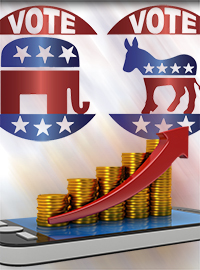| Events Refute "Money Corrupts Politics" Myth |
 |
|
By Timothy H. Lee
Wednesday, November 04 2015 |
"The Democrats have the ultimate super-PAC. It's called the mainstream media. And I'll tell you why. Last week, Hillary Clinton went before a committee. She admitted that she sent emails to her family saying, 'Hey, this attack in Benghazi was caused by al Qaeda-like elements.' She spent over a week telling the families of those victims and the America people that it was because of a video. And yet, the mainstream media is going around saying it was the greatest week in Hillary Clinton's campaign. It was the week she got exposed as a liar. But she has her super-PAC helping her out - the American mainstream media." —Senator Marco Rubio (R - Florida), speaking at last week's CNBC Republican presidential debate. The myth of our political system broken by the corrupting influence of money is a particularly stubborn one. Bernie Sanders, who for decades remained an obscure Socialist Senator unrecognizable to anyone outside of Vermont, has vaulted himself to the forefront of the Democratic presidential race by endlessly thundering against a political system allegedly broken by millionaires and billionaires. He further claims that only the wealthy are capable of advancing in American society, never mind that even "poor" Americans today hold in the palms of their hands more information and entertainment than was available to even the wealthiest Americans ten or twenty years ago. But that stubborn myth isn't confined to the rabid political left. After all, Senator Rubio's observation above came in response to fellow Republican candidate Donald Trump's prototypically vague jeremiad against super-PACs and candidates who allegedly benefit from them. Of course, it's a convenient claim to make for a self-financing multi-millionaire who enjoys a media at his beck and call. Perhaps Trump believes that the candidate field should be limited to self-financing billionaires like himself. Also on the Republican side, Arizona Senator John McCain bestowed upon the nation his namesake McCain-Feingold law, that byzantine affront to the First Amendment's explicit admonition that "Congress shall make no law ... abridging the freedom of speech." For years before and since that statute was signed into law by President George W. Bush, who inexcusably considered it unconstitutional but passed the buck to the Supreme Court in hopes that it would be overturned, McCain has inveighed against the alleged corrupting influence of money in politics. Conspicuously, however, McCain and others who support such abridgments of free speech fail or refuse to identify specific examples of fellow Senators corrupted in such a manner. He has now been a member of Congress for over three decades, so one would presume ample opportunity for him to have exposed examples of which he has first-hand knowledge. McCain's failure to produce actual examples to justify wholesale federal regulation of political speech isn't even the most obvious and fundamental flaw in speech restrictionists' edifice. Rather, the current presidential race, supposedly corrupted in the wake of the Supreme Court's 2010 Citizens United decision, offers an even more immediate and vivid refutation. Specifically, if our political system is hopelessly corrupted by sinister dark money, then how is it that Senator Sanders has managed to threaten the Hillary Clinton juggernaut nationwide, and even lead her in the critical early voting states of Iowa and New Hampshire, without the assistance of powerful super-PACs? Shouldn't he remain consigned to anonymity, if his allegations were true? For that matter, would Barack Obama have defeated the Clinton machine in 2008 if corrupt money dictated winners and losers? And on the Republican side, how does one explain non-politician Ben Carson's lead or Jeb Bush's well-financed flop? In 1980, former Texas Governor John Connolly would've secured the nomination, not Ronald Reagan or George H. W. Bush, if the candidate with the most money won. Beyond politics, if American society is so subject to well-financed brainwashing, how does one explain the failures of the Ford Edsel or New Coke? The obvious answer is that our political system is more corrupted by politicians themselves than private dollars spent on political speech and policy messaging. Just as obviously, established politicians and the mainstream media stand to benefit most from demonizing money spent by private citizens to support the candidates and causes that they choose. If politics is truly controlled by a select few, then how much worse would it be if private outside voices were further silenced, leaving the powerful and overwhelmingly liberal mainstream media to fill the void and dominate even more completely? Moreover, if Citizens United were incorrectly decided, and First Amendment free speech rights do not extend to citizens who have pooled their resources in the form of legal corporations, then aren't media giants like NBC, CBS, ABC, The New York Times and The Washington Post also subject to censorship since they're also corporate entities? The better alternative, particularly in a society with ever-expanding sources of information like Twitter and blogs and independent journalism, is to allow more voices, not fewer. More freedom of private speech, not less. Otherwise, the atrocious display of the scornfully liberal CNBC debate moderators would only become increasingly commonplace. Regardless of one's opinion of Senator Rubio as a political figure or candidate, he got it right on this issue. Instead of today's multitude of super-PACs representing numerous perspectives and candidates, campaign finance "reform" zealots would effectively reduce the number of super-PACs to one: the mainstream media, enabler of liberals. That's not something countenanced by the First Amendment, and it's not something that Americans who prefer a wider variety of viewpoints and candidates should tolerate. |
Related Articles : |
























